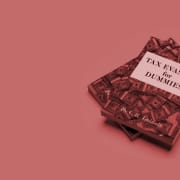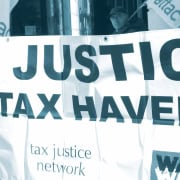|
Getting your Trinity Audio player ready...
|
When corruption is exposed, it is a given that the corrupt will fight back tooth and nail, clinging with all their might to that easy and lucrative source of income or power.
A new report, released in April 2024 by the Tax Justice Network, reveals how those who operate in secrecy have found a strategy to turn back the clock on hard-fought transparency advances. Titled Privacy-Washing & Beneficial Ownership Transparency: Dismantling the weaponisation of privacy against beneficial ownership transparency, the report focuses on unpicking the arguments used to weaponise privacy rights against beneficial ownership transparency, covering four focus areas:
- Rights to privacy and personal data protection,
- Rights that are put at risk by a lack of public transparency,
- Arguments about increased risks of harm and crime, and
- Arguments about who should access beneficial ownership information.
Secrecy, after all, is the main enabling factor in corruption. Why would the corrupt not advance convincing arguments in their attempts to retain it?
“After decades of slow but steady transparency progress in, for example, automatic exchange of banking information, beneficial ownership transparency, and country by country reporting,” says TJN lead researcher: beneficial ownership, and report author Andres Knobel, “they are weaponising the rights to privacy and data protection to prevent access to information by the public as well as by competent authorities.”
Meanwhile, billions of dollars related to tax evasion or avoidance, money laundering, corruption, or the financing of terrorism continue to flow along clandestine channels and into overseas bank accounts, crypto-assets, real estate, and businesses, via a complex net of transactions that makes it hard for investigators to trace the routes. The beneficiaries of this criminal largesse do not worry about law enforcement, taxes, or public scrutiny, thanks to assistance from their enablers – lawyers, accountants, service providers, and others.
“We need to reinstate the path to transparency to prevent the rich and powerful from escaping the rule of law that applies to everyone.”
Corporate secrecy a valuable tool for the corrupt
Secrecy provides crucial benefits for criminals, says Knobel – it hides the origin of money, it hides the movement or the real purpose of transactions that channel funds between countries, and it hides the destination of the funds.
“Different secrecy jurisdictions specialise in different forms of financial secrecy such as banking secrecy, anonymous companies, or unregistered assets like crypto-assets.”
Arguably the most fiercely guarded type of secrecy is corporate secrecy, which is a key component of hiding or disguising tax evasion or illicit financial flows from the rule of law.
“The basic solution to corporate secrecy lies in identifying the owners of companies,” says Knobel, adding that commercial registers in many countries, such as the one managed by South Africa’s Companies and Intellectual Property Commission, had been available for many years.
Furthermore, the collection and publishing of legal ownership data was not originally meant for preventing or investigating illicit financial flows, but for the well-functioning of markets, so that investors and businesspeople know who they are doing business with.
But with this information in the public domain, company owners with ill intent could not use these vehicles for nefarious purposes – therefore criminals found ways of circumventing the requirement.
“This involved hiding their ownership of companies on paper by misusing bearer shares, using nominees to register in their place, and, far more sophisticatedly, using complex ownership structures consisting of several layers of companies and entities spread around the world.”
Steps taken in recent years to prevent such misuse include the prohibition or regulation of the use of bearer shares and nominees. International standards also upgraded ownership requirements, requiring that competent authorities have access to information on the real beneficial owners of companies and other legal vehicles.
“Civil society organisations have yet more ambitious goals: access to automatic exchange of banking information by all developing countries; public access and comprehensive beneficial ownership transparency for trusts, listed companies and investment funds, fully public country by country reporting following the Global Reporting Initiative standard, a global asset registry, and more.”
The corrupt fight back
But this encouraging trend of progress and increased transparency is facing a big challenge.
“Secrecy promoters have discovered a successful weapon: manipulating the court system to threaten much of the transparency infrastructure that had previously been developed. There is now a real risk of sending us back to the dark ages of dirty money,” Knobel says.
These secrecy promoters have found that their arguments were well-received by courts and some country authorities.
For instance, on 22 November 2022, the European Court of Justice ruled that public access to beneficial ownership information for the purposes of money laundering violated the right to privacy, allowing several EU countries to close their public online registries, which had been available until that moment.
“This was not an isolated case, but part of a series of lawsuits and measures of weaponising the right to privacy, confidentiality and data protection against transparency.”
But six years before then, Knobel adds, a court in France invalidated public access to beneficial ownership information, ruling that it violated the right to privacy.
“This case from 2016 referred to public access to beneficial ownership information of trusts contained in a French trust registry that had been established to tackle, not money laundering, but the tax abuse risks of trusts.”
As recently as 24 May 2023, the Belgian Data Protection authority banned the automatic exchange of bank account information of “accidental” US citizens residing in Belgium to the US because it considered the agreement to exchange information was not in line with the EU general data protection regulation.
Right to privacy a legitimate concern
While the right to privacy is relevant and indisputable, these and other recent setbacks to access to beneficial ownership information are in reality aimed at protecting the money-laundering schemes of big corporates and the rich and powerful.
“Privacy is a fundamental human right … a cornerstone of this right to privacy is the right to protection of personal data, to give individuals control over the collection, processing, use, and sharing or disclosure of their personal information,” says Knobel.
Privacy, however, is not the same as secrecy.
“Secrecy is the act of concealing information from others. Privacy is the state of being not observed by others.”
Concerns around privacy are legitimate – but such concerns are being repurposed by secrecy enablers who prioritise their own interests in maintaining a system of financial secrecy that enables the rich and powerful to remain above the law.
“The only ones who would see the benefit of closing beneficial ownership registries are corrupt officials, sophisticated criminals, and high net worth individuals who employ complex offshore structures to undertake their affairs and hold their wealth, hidden and untaxed.”
It’s high time for all, especially the courts, argues Knobel, to recognise that these tactics are nothing more than a campaign for opacity, and that restoring public access to beneficial ownership is the first step towards stopping it.
Unravelling the arguments
“Claiming that public access to beneficial ownership violates privacy is a bold statement meant to elicit an emotive response,” says Knobel, adding that realistically only information about ownership is affected, not the more personal aspects meant to be protected by the right to privacy, such as health records, religion, sexual orientation, or political affiliation, among others. In any case, there are laws in place to protect such sensitive information.
“Instead, beneficial ownership transparency involves only information relating to a person’s interests in legal entities like companies and trusts, without any disclosure of unduly personal information.”
Claims regarding violations of privacy are therefore greatly exaggerated.
Furthermore, beneficial ownership laws are not disproportionate, as claimed by some – they apply to all beneficial owners, but the few bad apples engaging in wrongdoing would prefer to be exempt.
Another important factor to consider is that increased secrecy is itself a violation of various laws and rights, such as the right to access to information, the right to equality before the law, and the right to certain basic services such as health or housing.
In the latter case, “Corruption and tax abuse cost countries US$169-billion a year in taxes evaded by wealthy individuals, and US$311-billion a year in direct tax revenues lost through corporate tax abuse,” says Knobel. “This rip-off of state revenues prevents delivery of many basic human rights. Corporate secrecy and the abusive tax practices it fosters indirectly affects the rights to human dignity, life, education, health care, environmental protection, and consumer protection, because it results in the lack of funds to finance them.”
All in all, he adds, arguments to frame public access to beneficial ownership to appear as privacy and data protection issues easily fall apart under the slightest scrutiny, as presented in the report.
In fact, several countries within and outside of the EU have kept their beneficial ownership registries open, saying that the information is necessary for the prevention and detection of crime.
And while organisations such as the Financial Action Task Force, the World Bank, the Extractive Industry Transparency Initiative, the Open Government Partnership, and more, continue to press for increased transparency and less secrecy, the fight is not over.








